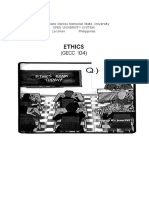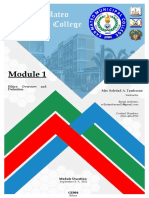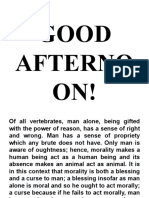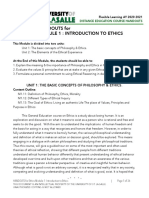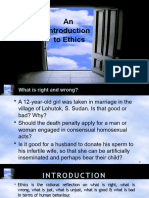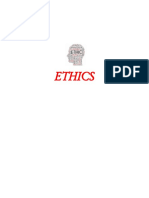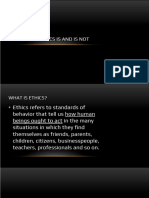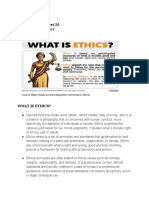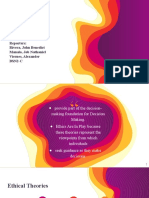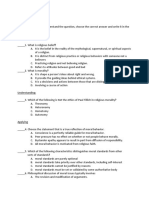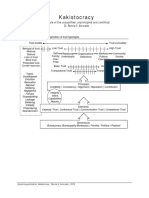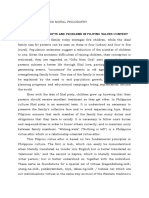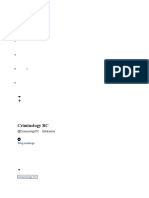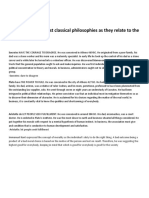Gecc 104 Module 1
Uploaded by
Mark JannszenGecc 104 Module 1
Uploaded by
Mark JannszenMODULE 1
KEY CONCEPTS
Lesson 1 Ethics in General
Lesson 2 Human Acts
Lesson 3 Ethics and Morality
Lesson 4 Moral and Non-Moral Standards,
and Moral Dilemmas
2
MODULE 1
KEY CONCEPTS
INTRODUCTION
Ethics deals with the principles of ethical behavior in modern society
at the level of the person, society, and interaction with the environment and
other shared sources (CMO 20 s 2013).The course was organized in into three
(3) main elements of moral experience: the agent, the act, and reason or
framework (for the act).
In this module, you will be introduced to the key concepts in Ethics, its
definition, functions, and historical background. This module will also teach
us the difference between human actions and acts of man; which of these are
required to have or be called “moral”. Module 1 will give us knowledge on
the difference between morality and Ethics, moral standards and non-moral
standards, and rules, and how they differ from other rules in our lives.
Also, the module will teach us what moral dilemma is, and its different
levels, and how a dilemma affects your decision making process.
OBJECTIVES
At the end of the module, students will be able to:
1. Differentiate between moral and non-moral problems;
2. Explain the different concepts pertaining to Ethics and morality;
3. Demonstrate a moral decision making in facing an ethical dilemma.
GECC 104 - ETHICS Module 1
3
LESSON 1
ETHICS IN GENERAL
Learning Outcomes:
1. Discuss the importance of ethics to man.
2. Explain the attributes and kinds of human acts.
Ethics is derived from the Greek word “ethos” which means “characteristic
way of acting.” Ethos refers to those characteristics belonging to man as a rational
being, endowed with intellect and free-will.
The following reveal the ethos of man as man:
1. Distinguishing between good and evil, right and wrong, moral and immoral.
2. Obligation to do what is good and to avoid what is evil.
3. Accountability for actions where much is expected of man to conduct himself to
the “dictates of reason.”
At its simplest, ethics is a system of moral principles. They affect how people make
decisions and lead their lives.
Ethics is concerned with what is good for individuals and society and is also described
as moral philosophy.
The term is derived from the Greek word ethos which can mean custom, habit,
character or disposition.
Ethics covers the following dilemmas:
how to live a good life;
our rights and responsibilities;
the language of right and wrong; and
moral decisions - what is good and bad?
Ethics, lts Meaning
According to Montemayor (1994), ethics is the practical science of the
morality of human acts. It is the science of human acts with reference to right and
wrong. It is the study of human conduct from the stand point of morality. Ethics is a
practical science that guides us in our actions that we may live rightly and well.
According to Socrates, ethics is the investigation of life. Ethics tells about
human conduct and the morality of human acts.
GECC 104 - ETHICS Module 1
4
The lmportance of Ethics to Man
Ethics is an indispensable knowledge. It means right living and good moral
character. It is in good moral character that man finds his-true worth and perfection.
Without moral perception man is only an animal. Man as a rational being is a failure
without morality. Moral integrity is the only true measure of what man ought to be.
All the great teachers of the ages maintain that the supreme purpose of human being
ties on the development of moral qualities which lift man far above animal creation,
not in the acquisition of material goods or bodily pleasure.
Ethics teaches man to act in accordance with his rational nature by giving
him the rules of human conduct. Acting in accordance with his rational nature
eventually leads man to the acquisition of his super-natural destiny-his union with
God.
Ethics enables man to live together in harmony, by furnishing them with the
norms that regulate their relations with other men, making life in society possible.
The primary objective of education is the harmonious development of the
whole man. Emphasis should be given on the moral training of students. The head,
heart and the will should be trained for balanced development.
Knowledge is good, bodily health and strength are good but first and above
all is - good character.
Approaches to Ethics
Philosophers nowadays tend to divide ethical theories into three areas: meta-
ethics, normative ethics and applied ethics.
Meta-ethics deals with the nature of moral judgment. It looks at the origins and
meaning of ethical principles.
Normative ethics is concerned with the content of moral judgments and the criteria
for what is right or wrong.
Applied ethics looks at controversial topics like war, animal rights and capital
punishment.
The Role of Ethics
Ethics can provide a moral map
Most moral issues get us pretty worked up - think of abortion and
euthanasia for starters. Because these are such emotional issues we often let
our hearts do the arguing while our brains just go with the flow.
GECC 104 - ETHICS Module 1
5
But there's another way of tackling these issues, and that's where
philosophers can come in - they offer us ethical rules and principles that
enable us to take a cooler view of moral problems.
So ethics provides us with a moral map, a framework that we can use
to find our way through difficult issues.
Ethics as source of group strength
One problem with ethics is the way it's often used as a weapon. If a
group believes that a particular activity is "wrong" it can then use morality as
the justification for attacking those who practice that activity. When people
do this, they often see those who they regard as immoral as in some way less
human or deserving of respect than themselves; sometimes with tragic
consequences.
In the words of George Washington, “Morality and religion are the
two indispensable pillars to human prosperity and happiness.”
Plato considers ethics as the supreme science, as it is this science
that deals with the Summum Bonum (“the greatest good”), the supreme
purpose of human living.
THINK!
Ethics is the supreme science. Do you agree with this view? On
the basis of this view ethics is the most important subject in any
curriculum.
GECC 104 - ETHICS Module 1
6
Two Ethical Systems
There are two general categories under which ethical theories may be
classified: the Atheistic and Theistic approaches. Classification is as follows:
Atheistic Theistic
There is no God who creates and God is the Supreme, Creator
rules the universe and Law giver.
The concept of good and evil is There are absolute
relative and changeable principles of morality which
do not change
Man has immortal soul that
Man is a matter and does not have
cannot die
spiritual dimension
Man is free and must use his
Man is free and must exercise his
freedom to promote his
freedom to promote the welfare of
personal and social interests
society
along with his fellowmen
Man deserves either a
There is no life after death. reward or punishment in
this life or in the next.
Man is accountable for his
Man is accountable only to the state.
actions. Everything must
conform to God’s eternal
plan of creation.
LEARNING ACTIVITY
Case:
Jerald and Vea are best friends. They were both enrolled in a
Catholic School under the Education Program. During their midterm exam,
Vea caught Jerald copying en toto the answers of Julya with the latter’s
consent. Is it obligatory on the part of Vea to report such incident to
Charo, the course facilitator? Are the acts of Jerald and Vea ethical? Or
moral? Or both?
GECC 104 - ETHICS Module 1
7
Lesson 2
The Role of
HUMAN ACTS
Learning Outcomes:
1. Compare and contrast human acts to acts of man.
2. Demonstrate human acts in everyday living.
Human Acts
Every minute of his life, man acts transforming himself and the world
around him. What kind of man or person he is depends largely on the type of
actions he performs during his life-time.
Human acts are those of which a man is master, which he has the power
of doing or not doing as he pleases. (No. 2. See also Ment. Phil., Nos. 194-
199.) The good acts our reason commends and approves; these we call right.
Evil acts, on the contrary, our reason disapproves and blames; these we call
wrong. The ideas of right and wrong, like those of truth and falsity, substance
and accident, cause and effect are "primary ideas" which are common to all
men; hence, they are trustworthy ideas -- that is, the distinction existing in
the mind between right and wrong corresponds to a distinction existing
objectively in human acts.
Human acts are those which man performs knowingly, freely and
voluntarily, These actions are the result of conscious knowledge and are
subject to the control of the will. These actions are deliberate, intentional or
voluntary.
Acts of man are instinctive and are not within the control of the will.
Such actions are the biological and physiological movements in man such as
metabolism, respiration, fear, anger, love and jealousy.
The Morality of Human Acts
“Human acts, that is, acts that are freely chosen in consequence of a
judgment of conscience, can be morally evaluated. They are either good or
evil” (Catechism of the Catholic Church, 1749).
“Acting is morally good when the choices of freedom are in conformity
with man’s true good and thus express the voluntary ordering of the person
towards our ultimate end: God himself.”
The morality of human acts depends on:
— the object chosen;
— the end sought or the intention;
GECC 104 - ETHICS Module 1
8
— the circumstances of the action.
“The object, the intention, and the circumstances make up the
‘sources,’ or constitutive elements, of the morality of human acts”
(Catechism of the Catholic Church, 1750).
Essential Attributes of Human Acts
Human act has the following characteristics:
1. Knowledge. It is performed consciously by the agent and he is
aware of its consequences.
2. Freewill. It is performed by an agent freely, that is by his own
volition and powers.
3. Intention. It is performed by an agent who decides willfully to do
the act.
The lack of any of the three attributes renders an act defective and
less voluntary.
Human act is imputable to the agent. This means that the person
performing the act is liable to such act. The doer is either deserving of reward
or punishment.
Immoralities, unless prohibited by law are not given legal punishments
such as fines or imprisonment. Spiritual death as found in the bible is a form
of punishment. As form of punishment spiritual death is the loss of peace of
mind – the only genuine happiness in this life. On the other hand, peace
contentment and honor are the rewards to an upright individual.
Kinds of Human Acts
1. Elicited acts are performed by the will and are not bodily externalized.
2. Commanded acts are either internal or external actions. Examples of
internal actions are reasoning, recalling something, encouraging oneself,
etc.
The elicited acts as enumerated by Paul Glenn in the book of Agapay
(1991) are:
1. Wish which is the tendency of the will towards something, whether
it can be realized or not.
2. Intention refers to the tendency of the will towards something
attainable but without necessarily committing oneself to attain it.
3. Consent which is the tendency of the will of those needed to carry
on the intention.
GECC 104 - ETHICS Module 1
9
4. Election which is the selection of the will of those means effective
enough to carry on the intention.
5. Use which refers to the command of the will to make use of these
means elected to carry out the intention.
6. Fruition which is the enjoyment of the will derived from the
attainment of the thing he had desired earlier.
The End of Human Acts
Man does not act without an end or purpose. He acts because he enjoys
the action, or because he wants to achieve something.
Let us distinguish the end of the agent/doer and the end of the act.
The end of the agent/doer is the goal which the agent or doer intends
to achieve. The end of the agent/doer is called the motive. It is the force
that sustains the act and brings it to completion.
Example. The person eats to satisfy his hunger and he reads to relax
himself.
The end of the act is the natural termination of an activity.
Example. The end of eating is nourishment that of reading is
comprehension.
Kinds of Ends
1. Proximity
The proximate end is the purpose which a doer wishes to accomplish
immediately by his action. Remote end is the purpose which the doer
wishes to accomplish in a series of acts.
Example: The Proximate end of eating is the satisfaction of hunger. Its
remote end is the promotion of good health.
2. Ultimacy
The ultimate end is the purpose which is desired for its own sake and
not because of something else. The intermediate end is the purpose which
is desired as a means for obtaining another thing. The attainment of
ultimate end completes an act and stops all further acts. The attainment
of an intermediate end leads to either another intermediate end or an
ultimate end.
THINK!
Based on your student life, give an example of ultimate end and
intermediate end. Explain how you achieve your ultimate end.
GECC 104 - ETHICS Module 1
10
Principles of Human Acts by Panizo
1. Every agent performs an action for the sake of an end or purpose to be
attained. For a man to act he must first have a motive.
2. Every agent acts towards an ultimate end.
3. Every agent has the power to move himself towards an end which he finds
suitable for him.
The end is the motivation of an act. What good can motivate man to act?
Only what is good can be suitable to man, because man does not desire evil
for its own sake. According to Aristotle that “good” means either good as an
end in itself or good as a means to another end. Good is that which fits a
function. The good of a man is that which fits his rational being.
Human beings have their needs and wants.
Needs are good which are essential to man as man. Man is incomplete
without them. Ex. Knowledge, virtue, food, shelter, clothing.
Wants may be good depending an individual requirements which is
brought about by one’s particular circumstances in life. Example. Car, power,
luxury, etc.
Kinds of Goods According to Agapay
1. Essential and accidental – those goods that fit the natural needs of man as
man are essential. Those that fit the wants of an individual are accidental.
2. Real and apparent – a real good is something which has an intrinsic value.
Good acts and habits are examples of real good. Real good includes both
essential and accidental.
3. Perfective and non-perfective – perfective good contributes to the
perfection of a person. Examples are education, virtue, food. Non-
perfective good merely contributes to the external appearance of a
person.
4. Perfect and imperfect good – also called absolute and relative good.
Perfect good has the fullness of qualities enabling it to fully satisfy human
desire. Only God, in the absolute sense, is perfect good. Imperfect good
has only certain qualities so that it does not fully satisfy human desire. All
earthly goods are imperfect.
GECC 104 - ETHICS Module 1
11
The Greatest Good
Man seeks that which is good, the greatest good in every activity. In
the language of the philosophers, the greatest good is Summum Bonum, God.
For Aristotle, the greatest good is happiness. It is the ultimate purpose
of life. Happiness is a state of being perfect arising from the possession of the
good. Happiness coming from the possession of the greatest good constitutes
man’s perfection.
Now, what is the greatest good? Christian philosophers, notably St.
Augustine and St. Aquinas, believed that man, in every deliberate action acts
toward an end, and ultimately, to an absolutely ultimate end: happiness.
Since man’s desire and tendency towards happiness is unlimited, nothing
short of the absolutely perfect Good can satisfy it perfectly. Therefore, God
the Infinite Good is the greatest good or “Summum Bonum” to be attained as
the ultimate end.
Man cannot attain perfect happiness in this life, because God can never
be known perfectly by man’s natural powers. But man can approximate
perfect happiness in this life by knowledge and love of God and by the
exercise of virtue. (Paul Glenn: The History of Philosophy, a text book of
undergraduates, London: Herder Book, Co., 1963)
LEARNING ACTIVITY
Write an essay on this topic: "WHAT I NEED TO BE HAPPY"
GECC 104 - ETHICS Module 1
12
Lesson 3
ETHICS AND MORALITY
Learning Outcomes:
1. Differentiate what is legal to that of what is ethical, and be able to
establish the relationship between them.
2. Demonstrate the importance of following rules in the society.
Morality and Ethics
Maybe you’ve heard these terms and wondered what the difference is.
A lot of people think of them as being the same thing.
While they’re closely related concepts, morals refer mainly to guiding
principles, and ethics refer to specific rules and actions, or behaviors.
A moral precept is an idea or opinion that’s driven by a desire to be
good. An ethical code is a set of rules that defines allowable actions or correct
behavior.
The concepts are similar, but there are some subtle differences.
What does morals mean?
A person’s idea of morals tends to be shaped by their surrounding
environment (and sometimes their belief system). Moral values shape a
person’s ideas about right and wrong.
Morality is the quality of human acts by which they are constituted as
good, bad or indifferent.
Morality- speaks of codes/system of behaviour in regards to standards
or right or wrong behaviour.
They often provide the guiding ideas behind ethical systems. Morals
are the basis for ethics. A moral person wants to do the right thing, and a
moral impulse usually means best intentions.
What does ethics mean?
Ethics is a branch of philosophy that studies morality or the
righteousness or wrongness of human conduct.
GECC 104 - ETHICS Module 1
13
As a branch of philosophy, ethics stands to queries about what there is
reason to do. Dealing with human actions and reasons for action, ethics is also
concerned with character.
Some questions that are ethical in nature are:
1. What is good?
2. Who is a moral person?
3. What are the virtues of a human being?
4. What makes an act right?
5. What duties do we have for each other?
Also called “moral philosophy”, ethics evaluates moral concepts, values,
principles, and standards. Because it is concerned with norms of human
conduct, ethics is considered a normative study of human actions.
Ethics are distinct from morals in that they’re much more practical.
An ethical code doesn’t have to be moral. It’s just a set of rules for people
to follow. Several professional organizations have created specific ethical
codes for their respective fields.
In other words, an ethical code has nothing to do with cosmic
righteousness or a set of beliefs. It’s a set of rules that are drafted by trade
groups to ensure members stay out of trouble and act in a way that brings
credit to the profession.
Ethics aren’t always moral … and vice versa
It’s important to know that what’s ethical isn’t always what’s moral, and
vice versa. Omerta, for example, is a code of silence that developed among
members of the Mafia. It was used to protect criminals from the police. This
follows the rules of ethically-correct behavior for the organization, but it can
also be viewed as wrong from a moral standpoint.
A moral action can also be unethical. A lawyer who tells the court that his
client is guilty may be acting out of a moral desire to see justice done, but
this is deeply unethical because it violates the attorney-client privilege.
In our vocabulary, you’ll find that most people use the words, ethics and
morality interchangeably, as if they were synonyms. But historically, that’s
not been the case.
The English word “ethic” or “ethics” comes from the Greek word ethos.
The word “morals” or “morality” comes from the word mores. The difference
is that the ethos of a society or culture deals with its foundational philosophy,
its concept of values, and its system of understanding how the world fits
together. There is a philosophical value system that is the ethos of every
GECC 104 - ETHICS Module 1
14
culture in the world. On the other hand, mores has to do with the customs,
habits, and normal forms of behavior that are found within a given culture.
In the first instance, ethics is called a normative science; it’s the study
of norms or standards by which things are measured or evaluated. Morality,
on the other hand, is what we would call a descriptive science. A descriptive
science is a method to describe the way things operate or behave. Ethics are
concerned with the imperative and morality is concerned with the indicative.
What do we mean by that? It means that ethics is concerned with “ought-
ness,” and morality is concerned with “is-ness.”
Ultimately, the science of ethics is concerned with what is right, and
morality is concerned with what is accepted. In most societies, when
something is accepted, it is judged to be right. But oftentimes, this provokes
a crisis for the Christian. When the normal becomes the normative, when
what is determines what ought to be, we may as Christians find ourselves
swimming hard against the cultural current.
The Christian concept of ethics is on a collision course with much of
what is being expressed as morality. This is because we do not determine
right or wrong based on what everybody else is doing. For example, if we
study the statistics, we will see that all men at one time or another lie. That
doesn’t mean that all men lie all the time, but that all men have indulged in
lying at some time or another. If we look at that statistically, we would say
that one hundred percent of people indulge in dishonesty, and since it’s one
hundred percent universal, we should come to the conclusion that it’s
perfectly normal for human beings to tell lies. Not only normal, but perfectly
human. If we want to be fully human, we should encourage ourselves in the
direction of lying.
But that’s not what usually occurs in our culture. Such obvious
problems in developing a statistical morality are often overlooked. The Bible
says that we lean toward lying, and yet we are called to a higher standard.
As Christians, the character of God supplies our ultimate ethos or ethic, the
ultimate framework by which we discern what is right, good, and pleasing to
Him.
Clearly, ethics and morality necessarily carry the concept of moral
standards or rules with regard to behavior. So as a way of introducing moral
rules, let us discuss why rules are important to social beings in the succeeding
lessons.
LEARNING ACTIVITY
Explain:
What is legal is not necessarily moral but what is moral should be worth
legalizing.
GECC 104 - ETHICS Module 1
15
Rules in Society
Rules refer to explicit or understood regulations or principles governing
conduct within a specific activity or sphere. Rules tell us what is or is not
allowed in a particular context or situation. In many ways, rules serve as a
foundation for any healthy society. Without rules society would likely to fall
into anarchy.
Rules benefit social beings in various manners:
a. Rules protect social beings by regulating behavior
Rules build boundaries that place limits on behavior. Rules are usually
coupled with means to impose consequences on those who violate them. One
of the reasons people follow accepted rules is to avoid negative
consequences.
b. Rules help to guarantee each person certain rights and freedom
Rules form frameworks for society. Nations are generally nations of laws
and the governing principles are outlined in what is called constitution.
Because the majority has agreed to follow and consent to be governed by such
constitution, the freedoms outlined exist. One of the advantages of such
system is that each person is guaranteed certain rights as the government is
limited in its power ensure that it does not become powerful enough to
suppress liberty. Rules on divisions of power and checks and balances further
protect individual liberty.
c. Rules produce a sense of justice among social beings
Rules are needed in order to keep the strong from dominating the weak,
that is, to prevent exploitation and domination. Without rules, schemes in
which those with power control the system would take over. In effect, rules
generate a stable system that provides justice, in which even the richest and
most powerful have limitations on what they can do. If they transgress rules
such as laws and ordinances and take advantage of people, there are
consequences both socially and criminally.
d. Rules are essential for a healthy economic system
Without rules regulating the business, power would centralize around
monopolies and threaten the strength and competitiveness of the system.
Rules are needed to ensure product safety, employee safety, and product
quality. Copyright and patents help protect people’s intellectual property.
Rules and regulations also keep the banking system stable so as to avoid
depression and the like.
In short, society could not soundly function without rules and regulations.
Rules are necessary to protect the greater good. Even the freest societies
GECC 104 - ETHICS Module 1
16
ought to have rules in order to avoid exploitations and tyranny while
upholding the common welfare.
LEARNING ACTIVITY
Recall some rules you have to follow in school and community.
1. What rules do you find constricting?
2. Explain why people have to follow rules.
GECC 104 - ETHICS Module 1
17
Lesson 4
MORAL AND NON- MORAL
STANDARDS, AND MORAL
DILEMMA
Learning Outcomes:
1. Categorize actions that belongs to moral and non-moral standards.
2. Identify and differentiate the different levels of dilemma.
In the previous lesson, you have read about rules, its definition and
importance in general. Today’s lesson, we will discuss why not all rules are moral
rules and that not all rules pertain to the aspect of morality.
Morality may refer to the standards that a person or a group has about what
is right and wrong, or good and evil. Accordingly, moral standards are those
concerned with or relating to human behavior esp. distinction between good or bad
behavior.
Moral standards involve the rules people have about the kinds of actions they
believe are morally right and wrong, as well as the values they place on the kinds of
object they believe are morally good or bad. Some ethicists equate moral standards
with moral values and moral principles.
According to some scholars, moral standards are the sum of combined norms
and values. In other words, norms plus values equal moral standards. On the one
hand, norms are understood as general rules about our actions or behaviors. For
example, we may say “We are always under the obligation to fulfill our promises” or
“It is always believed that killing innocent people is absolutely wrong”. On the other
hand, values are understood as enduring beliefs or statements about what is good
and desirable or not. For example, we may say “Helping the poor is good” or
“Cheating during exams is bad”.
Non-moral standards refer to rules that are unrelated to moral or ethical
considerations. Either these standards are not necessarily linked to morality or by
nature lack ethical sense. Basic examples of non-moral standards include rules of
etiquette, fashion standards, rules in games, and various house rules.
Non-moral standards refer to standards by which we judge what is good or
bad and right or wrong in a non-moral way. Examples of non-moral standards are
standards of etiquette by which we judge manners as good or bad, standards we call
the law by which we judge something as legal or illegal, and standards of aesthetics
by which we judge art as good or rubbish. Hence, we should not confuse morality
with etiquette, law, aesthetics or even with religion.
GECC 104 - ETHICS Module 1
18
Technically, religious rules, some traditions, and legal statutes (i.e. laws and
ordinances) are non-moral principles, though they can be ethically relevant
depending on some factors and contexts.
As we can see, non-moral standards are matters of taste or preference.
Hence, a scrupulous observance of these types of standards does not make one a
moral person. Violation of said standards also does not pose any threat to human
well-being.
Finally, as a way of distinguishing moral standards from non-moral ones, if a
moral standard says “Do not harm innocent people” or “Don’t steal”, a non-moral
standard says “Don’t text while driving” or “Don’t talk while the mouth is full”.
The following six (6) characteristics of moral standards further
differentiate them from non-moral standards:
a. Moral standards involve serious wrongs or significant benefits.
Moral standards deal with matters which can seriously impact, that is, injure
or benefit human beings. It is not the case with many non-moral standards. For
instance, following or violating some basketball rules may matter in basketball
games but does not necessarily affect one’s life or wellbeing.
b. Moral standards ought to be preferred to other values.
Moral standards have overriding character or hegemonic authority. If a moral
standard states that a person has the moral obligation to do something, then he/she
is supposed to do that even if it conflicts with other non-moral standards, and even
with self-interest.
Moral standards are not the only rules or principles in society, but they take
precedence over other considerations, including aesthetic, prudential, and even
legal ones. A person may be aesthetically justified in leaving behind his family in
order to devote his life to painting, but morally, all things considered, he/she
probably was not justified. It may be prudent to lie to save one’s dignity, but it
probably is morally wrong to do so. When a particular law becomes seriously
immoral, it may be people’s moral duty to exercise civil disobedience.
There is a general moral duty to obey the law, but there may come a time
when the injustice of an evil law is unbearable and thus calls for illegal but moral
noncooperation (such as the antebellum laws calling for citizens to return slaves to
their owners).
c. Moral standards are not established by authority figures.
Moral standards are not invented, formed, or generated by authoritative
bodies or persons such as nations’ legislative bodies. Ideally instead, these values
ought to be considered in the process of making laws. In principle therefore, moral
standards cannot be changed nor nullified by the decisions of particular authoritative
body. One thing about these standards, nonetheless, is that its validity lies on the
soundness or adequacy of the reasons that are considered to support and justify
them.
GECC 104 - ETHICS Module 1
19
d. Moral standards have the trait of ‘universalizability.’
Simply put, it means that everyone should live up to moral standards. To be
more accurate, however, it entails that moral principles must apply to all who are
in the relevantly similar situation. If one judges that act A is morally right for a
certain person P, then it is morally right for anybody relevantly similar to P.
This characteristic is exemplified in the Golden Rule, “Do unto others what
you want them do unto you (if you were in their shoes)” and in the formal Principle
of Justice, “It cannot be right for A to treat B in a manner in which it would be wrong
for B to treat A, merely on the ground that they are two different individuals, and
without there being any difference between the natures or circumstances of the
two which can be stated as a reasonable ground for difference of treatment.”
Universalizability is an extension of the principle of consistency, that is, one ought
to be consistent about one’s value judgments.
e. Moral standards are based on impartial considerations.
Moral standard does not evaluate standards on the basis of the interests of a
certain person or group, but one that goes beyond personal interests to a universal
standpoint in which each person’s interests are impartially counted as equal.
Impartiality is usually depicted as being free of bias or prejudice. Impartiality
in morality requires that we give equal and/or adequate consideration to the
interests of all concerned parties.
f. Moral standards are associated with special emotions and vocabulary.
Prescriptivity indicates the practical or action-guiding nature of moral
standards. These moral standards are generally put forth as injunction or imperatives
(such as, ‘Do not kill,’ ‘Do no unnecessary harm,’ and ‘Love your neighbor’). These
principles are proposed for use, to advise, and to influence to action. Retroactively,
this feature is used to evaluate behavior, to assign praise and blame, and to produce
feelings of satisfaction or of guilt.
If a person violates a moral standard by telling a lie even to fulfill a special
purpose, it is not surprising if he/she starts feeling guilty or being ashamed of his
behavior afterwards. On the contrary, no much guilt is felt if one goes against the
current fashion trend (e.g. refusing to wear tattered jeans).
Why the need to distinguish moral standards from non-moral ones?
It is important to note that different societies have different moral beliefs
and that our beliefs are deeply influenced by our own culture and context. For this
reason, some values do have moral implications, while others don’t. Let us consider,
for example, the wearing of hijab. For sure, in traditional Muslim communities, the
wearing of hijab is the most appropriate act that women have to do in terms of
dressing up. In fact, for some Muslims, showing parts of the woman’s body, such as
the face and legs, is despicable. However, in many parts of the world, especially in
Western societies, most people don’t mind if women barely cover their bodies. As a
matter of fact, the Hollywood canon of beauty glorifies a sexy and slim body and the
wearing of extremely daring dress. The point here is that people in the West may
have pitied the Muslim women who wear hijab, while some Muslims may find women
who dress up daringly despicable.
GECC 104 - ETHICS Module 1
20
This clearly shows that different cultures have different moral standards.
What is a matter of moral indifference, that is, a matter of taste (hence, non-moral
value) in one culture may be a matter of moral significance in another.
Now, the danger here is that one culture may impose its own cultural
standard on others, which may result in a clash in cultural values and beliefs. When
this happens, as we may already know, violence and crime may ensue, such as
religious violence and ethnic cleansing.
How can we address this cultural conundrum?
This is where the importance of understanding the difference between moral
standards (that is, of what is a moral issue) and non-moral ones (that is, of what is a
non-moral issue―thus, a matter of taste) comes in. This issue may be too obvious
and insignificant for some people, but understanding the difference between the two
may have far-reaching implications.
For one, once we have distinguished moral standards from non-moral ones,
of course, through the aid of the principles and theories in ethics, we will be able to
identify fundamental ethical values that may guide our actions. Indeed, once we
know that particular values and beliefs are non-moral, we will be able to avoid
running the risk of falling into the pit of cultural reductionism (that is, taking
complex cultural issues as simple and homogenous ones) and the unnecessary
imposition of one’s own cultural standard on others.
The point here is that if such standards are non-moral (that is, a matter of
taste), then we don’t have the right to impose them on others. But if such standards
are moral ones, such as not killing or harming people, then we may have the right to
force others to act accordingly. In this way, we may be able to find a common moral
ground, such as agreeing not to steal, lie, cheat, kill, harm, and deceive our fellow
human beings.
LEARNING ACTIVITY
Differentiate between moral and non-moral standards. Cite 2-3
differences between the two.
Moral Dilemma
The term “dilemma” refers to situation in which a tough choice has to be
made between two or more options, especially more or less equally undesirable one.
Not all dilemmas are moral dilemmas.
Also called “ethical dilemmas”, moral dilemmas, are situations in which a
difficult choice has to be made between two courses of action, either which entails
GECC 104 - ETHICS Module 1
21
transgressing a moral principle. At the very least, a moral dilemma involves conflicts
between moral requirements.
The online Standford Encyclopedia of Philosophy, in discussing moral
dilemmas, gives this example from the Book I of Plato’s Republic:
“… Cephalus defines ‘justice’ as speaking the truth and paying one’s debts.
Socrates quickly refutes this account that it would be wrong to repay certain debts-
for example, to return a borrowed weapon to a friend who is not in his right mind.
Socrates’ point is not that repaying debts is without moral import; rather, he wants
to show that it is not always right to repay one’s debts at least not exactly when
the one to whom the debt is owed demands repayment. What we have here is a
conflict between two moral norms: repaying one’s debts and protecting others from
harm…” (Moral Dilemmas, n.d.)
What is common to moral dilemmas is conflict. In each ethical dilemma, an
agent regards himself as having moral reasons to do each of two actions, but doing
both actions seems to be ethically not possible.
The key features of a moral dilemma are these:
1. Agent is required to do each of two actions
2. Agent can do each of the actions, but cannot do both of the actions
In a moral dilemma the agent thus seems condemned to moral failure; no
matter what he does, he will do something wrong or fail to do something that he
ought to do.
In the case given above, many would say that it is more important to protect
people from harm than to return a borrowed weapon. Or, some would suggest that
the borrowed weapon can be returned later, when the owner no longer poses a
threat to others. It can be submitted therefore that the moral requirement to protect
others from serious harm overrides the ethical requirement to repay one’s debts by
returning a borrowed item even when its owner so demands.
Some ethicists propose that when one of the conflicting moral requirements
overrides the other, the case is not a genuine moral dilemma. Thus, in addition to
the feature mentioned above, in order to have a genuine moral dilemma, some add
that it must also be the case that (3) neither of the conflicting moral requirements
is overridden.
Three Levels of Moral Dilemmas
Moral dilemmas can be categorized according to these levels: (a) personal, (b)
organizational, and (c) structural.
a. Personal Dilemmas are experienced and resolved on the personal level; most
ethical decisions are personally made, thus, many moral dilemmas fall under this
level. There are many examples of personal dilemmas. If a person makes conflicting
promises, he faces a moral conflict; when an individual has to choose between the
life of a child who is about to be delivered and the child’s mother, he faces an ethical
dilemma.
GECC 104 - ETHICS Module 1
22
In 1957, the philosopher Jean-Paul Sartre provided a case that could exemplify a
personal moral dilemma:
“Sartre tells of a student whose brother had been killed in the German offensive
of 1940. The student wanted to avenge his brother and to fight forces that he
regarded as evil. But the student’s mother was living with him, and he was her one
consolation in life. The student believed that he had conflicting obligations. Sartre
describes him as being torn between two kinds of morality: one of limited scope but
certain efficacy, personal devotion to his mother; the other of much wider scope
but uncertain efficacy, attempting to contribute to the defeat of an unjust
aggressor.
b. Organizational Dilemmas refer to ethical cases encountered and resolved by
social organizations. This category includes moral dilemmas in business, medical
field, and public sectors.
A medical institution which believes that human life should not be
deliberately shortened and that unpreventable pain should not be tolerated
encounters a conflict in resolving whether to withdraw lie support from a dying
patient. This is a common moral dilemma faced by healthcare organizations.
Ethical dilemmas arise even in professional work. Administrative bodies in
business are confronted with situations in which several courses of action are
possible but none of them provide a total successful outcome to those affected by
the decisions or actions taken. Moral dilemmas in business involve issues about
corporate practices, policies, business behaviours, and the conducts and
relationships of individuals in the organizations. Other business-related dilemmas
pertain to the social responsibility of businesses, employee rights, harassment, labor
unions, misleading advertisement, job discrimination and whistle blowing.
In a public sector, government leaders and employees have a moral duty to
act in a manner that is fair and unbiased, that is loyal to the public by putting public
interest before personal gain, and that fulfills duties of competency, integrity,
accountability, and transparency. In fulfilling these responsibilities, public officials
may encounter foreseeable moral dilemmas. These dilemmas include whether or not
to favor family, friends, or campaign contributors over other constituents; favoring
the agenda of one’s political party over a policy one believes to be good for the
community; dealing with conflicting public duties or commission; resigning from
organizations in which membership may give rise to future conflicts; becoming a
whistle blower even if it means potentially derailing a policy objective one is
pursuing; and accepting gifts if it is legally permitted but creates the appearance of
impropriety.
c. Structural Dilemmas refer to cases involving network of institutions and operative
theoretical paradigm as they usually encompass multi- sectoral institutions and
organizations, they may be larger in scope and extent than organizational dilemmas.
Case in point is the prices of medicine in the Philippines which are higher
compared to other countries in Asia and in countries of similar economic status.
Factors affecting medicine prices include the cost of research, presence of
competition in the market, government regulations, and patent protection.
Institutions concerned may want to lower the cost of medicine, thereby benefiting
the Filipino public, but such move may ruin the interests or legal rights of the
GECC 104 - ETHICS Module 1
23
involved researchers, inventors or discoverers and pharmaceutical companies which
own the patent of the medicines or healthcare technologies.
Another case which is structural in nature is that of the Universal health Care
(UHC). Locally applied, it is called “Kalusugan Pangkalahatan” (KP). It is the
provision to every Filipino of the highest possible quality of health care that is
accessible, efficient, equitably distributed, adequately funded, fairly financed, and
appropriately used by an informed and empowered public. As a government
mandate, it intends to ensure that every Filipino shall receive affordable and quality
health benefits by providing adequate resources- health human resources, health
facilities, and health financing.
Concerning this program, health financing is first and foremost a big issue.
Government could set aside bigger budget for health for the implementation of this
provision. But then, this would mean cutting down allocations on other sectors (such
as education or public works).
“Only human beings can be ethical.”
Another basic tenet in ethics is the belief that only human beings can be truly
ethical. Most philosophers hold that unlike animals, human beings possess some traits
that make it possible for them to be moral.
a. Only human beings are rational, autonomous, and self-conscious.
The qualities of rationality, autonomy, and self-consciousness are believed to
confer a full and equal moral status to those that possess them as these beings are
the only ones capable of achieving certain values and goods. These values and goods
are something that outweighs the types of values and goods that non-rational, non-
autonomous, and non-self-conscious beings are capable of realizing. For instance, in
order to attain the kind of dignity and self-respect that human beings have, a being
must be able to conceive of itself as one among many and must be able to consciously
select his actions rather than be led by blind instinct.
Many ethicists thus believe that only human beings are beings that are rational,
autonomous, and self-conscious deserving of full and equal moral status.
Moreover, the values of appreciating art, literature, and the goods that come
with deep personal relationships all require a being to be rational, autonomous, and
self-conscious. These values and others like them, are the highest values to us
humans, they comprise those which make our lives worth living.
b. Only human beings can act morally or immorally
Strictly speaking, an animal which devours another animal cannot be said to be
immoral. In the same manner, no matter how “good” an animal’s action seems to
be, it cannot be technically said to be moral.
Only human beings can act morally and immorally. This is important in ethics
because only beings that can act morally can be required to sacrifice their interest
for the sake of others. Not able to truly act morally, animals could not really sacrifice
GECC 104 - ETHICS Module 1
24
their own good for the sake of others, but would even pursue their good at the
expense of others.
c. Only human beings are part of the moral community.
The so-called moral community is not defined in terms of the intrinsic properties
that being have, but rather in terms of essential social relations that exist between
or among beings. Distinctively, only human beings can possess or practice values such
as love, social relationships, forgiveness, compassion, and altruism.
Moreover, only human beings can communicate with each other in truly
meaningful ways, can engage in economic, political, and familial relationships with
each other, and can also form deep personal relationships with each other. These
kinds of relationships require members of such to extend real concern to other
members of these relationships in order for it to continue. These relationships are
what constitute our lives and the values contained in them.
Another thing human beings have that no animal has is the ability to participate
in a collective cognition. That is, we, as individuals, are able to draw on the
collective knowledge of humanity in a way no animal can.
Freedom as a Foundation of Morality
As explained above, one of the reasons animals cannot be truly ethical is that
they are not really autonomous or free. Likewise, a robot, no matter how beneficial
its functions may be, cannot be said to be moral, for it has no freedom or choice but
to work according to what is commanded based on its built-in program
Basically, morality is a question of choice. Morality is choosing ethical codes,
values, ethical standards to guide us in our daily lives. Philosophically, choosing is
impossible without freedom.
Morality requires and allows choice, which means the right to choose even
differently from our fellows. In their daily lives, people make the choice to give to
charities, donate time and money to schools, mentor children, open businesses, or
protest against animal cruelty.
Everyone who wishes to function morally and rationally in a society has to
make choices virtually every minute of the day. Practically, the sum of our choices
can be said to define our specific morality. Applicably, using the government or one’s
culture to coerce people to behave in a certain way is not morality but the antithesis
of morality.
Minimum Requirements for Morality: Freedom and Impartiality
The late philosophy professor James Rachels holds that moral judgments must
be backed by sound reasoning and that morality requires the impartial consideration
of all parties involved. It is thus submitted that reason and impartiality compose the
minimum conception of morality or, as some put it, the minimum requirement for
morality.
Reason as a requirement for morality entails that human feelings may be
important in ethical decisions, but they ought to be guided by reason. Sound
GECC 104 - ETHICS Module 1
25
reasoning helps us evaluate whether our feelings and intuitions about moral cases
are correct and defensible.
Impartiality on the other hand, involves the idea that each individual’s
interests and point of view are equally important. Also called evenhandedness or
fair-mindedness, impartiality is a principle of justice holding that decisions ought to
be based on objective criteria rather than on the basis of bias, prejudice, or
preferring the benefit to one person over another for improper reasons.
LEARNING ACTIVITY
1. Explain why only human beings can be ethical.
2. Explain: Freedom is the foundation of ethics.
3. Discuss the role of reason and impartiality in ethics.
GECC 104 - ETHICS Module 1
You might also like
- Module 1 - Overview and Definition of EthicsNo ratings yetModule 1 - Overview and Definition of Ethics5 pages
- Handouts For Module 1 Introduction To EthicsNo ratings yetHandouts For Module 1 Introduction To Ethics36 pages
- Unit 1: Introduction: Key Concepts of Ethics and Morality: 1.0 Intended Learning Outcomes100% (1)Unit 1: Introduction: Key Concepts of Ethics and Morality: 1.0 Intended Learning Outcomes14 pages
- Intro To Ethics, & Course Outline 2018-19No ratings yetIntro To Ethics, & Course Outline 2018-1995 pages
- The Stanford Prison Experiment: August 15-21, 1971No ratings yetThe Stanford Prison Experiment: August 15-21, 197182 pages
- John Rawls: Philosopher & 'A Theory of Justice' AuthorNo ratings yetJohn Rawls: Philosopher & 'A Theory of Justice' Author10 pages
- 12 Ethical Principles For Business Executives100% (3)12 Ethical Principles For Business Executives2 pages
- Ethical Theories: Reporters: Rivera, John Benedict Manalo, Job Nathaniel Viernes, Alexander BSN2-CNo ratings yetEthical Theories: Reporters: Rivera, John Benedict Manalo, Job Nathaniel Viernes, Alexander BSN2-C16 pages
- Kakistocracy: The Rule of The Unqualified, Unprincipled and UnethicalNo ratings yetKakistocracy: The Rule of The Unqualified, Unprincipled and Unethical3 pages
- MODULE 4:foundations of The Principles of Business EthicsNo ratings yetMODULE 4:foundations of The Principles of Business Ethics22 pages
- The Ethical Concepts and Problems in Filipino Values ContextNo ratings yetThe Ethical Concepts and Problems in Filipino Values Context5 pages
- Arboleda, Jaira A. Mr. Manny Sunga CAS05-501E EthicsNo ratings yetArboleda, Jaira A. Mr. Manny Sunga CAS05-501E Ethics2 pages
- 1586881222philosophical Approaches To Ethics UnitNo ratings yet1586881222philosophical Approaches To Ethics Unit19 pages
- Compare and Contrast Classical Philosophies As They Relate To The Business Setting100% (1)Compare and Contrast Classical Philosophies As They Relate To The Business Setting2 pages

